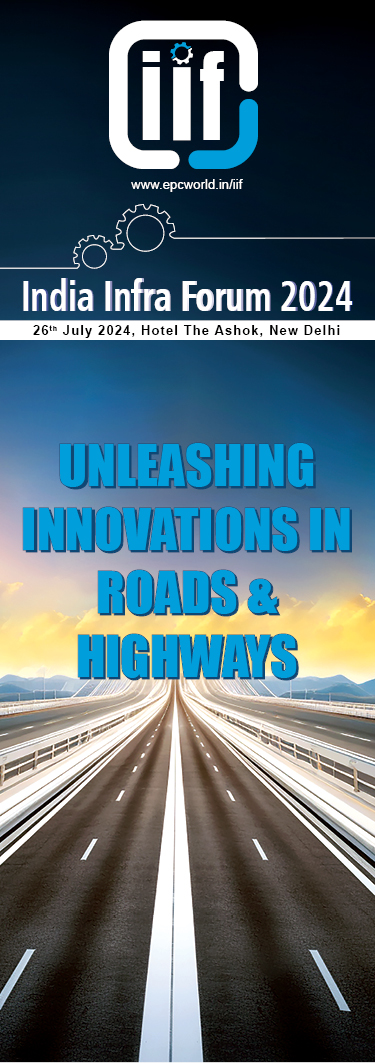By Tejasvi Sharma, Chief Editor, EPC World
The country’s urban landscape has undergone a dramatic alteration in an extremely short period of time. Rapid urbanization comes with its own set of issues including lack of sufficient infrastructure, governance and sustainability that can further hamper India’s growth trajectory. The sorry state of Indian cities with issues like rapidly growing population, poor infrastructure, growing waste, water woes, traffic snarls, air pollution and social frictions are some of the basic issues plaguing the present urban development scenario when it comes to urban planning. by Tejasvi Sharma
According to the Planning Commission research, the spate of economic reforms has already unleashed investment and growth offering its citizens rich opportunities. “Surging growth and employment in cities will prove a powerful magnet. 300 million Indians currently live in towns and cities and within 20-25 years, another 300 million people will get added to Indian towns and cities. This kind of urban expansion is slated to happen at a pace quite unlike anything that the country has seen before. It took nearly forty years for India’s urban population to rise by 230 million. It could take only half the time to add the next 250 million. If not well managed, this inevitable increase in India’s urban population will place enormous stress on the system,” says the research document.
Thus, it will be fair to say that cities play a very significant role in the overall development of the nation, contributing to over 50 percent of the GDP and providing employment opportunities to a large number of semi-skilled and unskilled migrants. Keeping the bigger development scenario of the country in mind, cities have a crucial role to play. Thus, making cities ‘smart’ is necessary.
Transforming Cities
It’s not just technology that holds the potential to create a smart city. However, it’s transformation that forms the basis and the backbone of a smart city. To combat this burgeoning issue of rapid urbanization and find a solution to the needs of the growing populace, Smart Cities Mission was launched in the country in 2015.
The Smart Cities Mission is an urban renewal and retrofitting program initiated by the central government with an intention to develop 100 cities across the country. The Centre has released nearly Rs. 9,940 crore to the states so far for the Smart Cities Mission while the total proposed investment in these cities was Rs. 2.03 lakh crore. Modernizing the Indian cities has its own set of unique challenges. “Some of the major hurdles that will be encountered during the full-fledged implementation of the Smart City Project include lack of effective horizontal and vertical coordination between central government (Ministry of Urban Development - MoUD), state government and the local government. Social and economic inequalities arising from unequal access to communication technology and financial and technical constraints of Urban Local Bodies (ULBs) due to financial unsustainability and limited technical capacity can also prove to be a hindrance. What can also cause delays is retrofitting existing city infrastructure and lack of efficient capacity building to support the mega project,” shares Santhosh Kumar, Vice Chairman – ANAROCK Property Consultants.
The urban sector in our country has to rely on the strengthening of the Urban Local Bodies (ULBs) for the smart cities mission to attain its desired success. ULBs have to play an important role, as the Smart City mission requires that ULBs and state governments collaborate together in the creations of SPVs with professional CEOs. While there are several constraints being faced by the ULBs at present, there are innovative and smart ways in which ULBs can become part of the development of Smart Cities without taking the entire burden.
The Planning Commission research further indicates how devolution has to be supported by more reforms in urban financing that will reduce cities’ dependence on the Centre and the states and unleash internal revenue sources.
Establishing smart cities would require huge funds for a longer period. “Previously, the Central and State governments funded the entire finance requirements. Currently, the process of funding is decentralized and the cities are raising additional funds to meet their financing needs from other sources as the government shells out for the core funding only,” adds Kumar.
PPP Potential
A World Economic Forum survey on smart cities indicate that reforms are required in the procurement process, land acquisition, permitting process, dispute resolution and to address risks in public private partnerships, such as changes in scope, market distortion, community risks and breach of contracts risks. These reforms must be made a priority to attract private-sector participation and give the smart city initiative a major push and a conducive environment to succeed.
Government statistics indicate how in the initial sixty cities selected there are 278 PPP projects worth Rs. 24,408 crore proposed to be developed with PPP. Out of these 278 projects, 20 PPP projects worth Rs. 367 crore have been completed and work has started in 51 more projects worth Rs. 4,767 crore by the end of December 2017. Further, tenders for 29 PPP projects worth Rs. 2,674 crore have issued tenders and are in the process of finalization. The PPP projects under implementations are spread across sectors like housing, waste to energy plants, smart parking, public bike sharing, Smart Card app – based citizen service delivery, installation of roof-top solar, etc.
According to PIB, Some of the major PPP smart city projects are: Bhubaneswar (Affordable housing - Rs. 840 cr), Raipur (Urban Plaza at Ganj Mandi- Rs. 983 cr), Bilaspur (Markets development – Rs. 1,241 cr), Amritsar (Urban space development – Rs. 1,028 cr), Coimbattore (Water supply - Rs. 557 cr), Warangal, Telangana (Bus stand- Rs. 611 cr), Shimla (Tourism and recreation infrastructure- Rs. 898 cr), Aligarh (Smart multi-level parking-` 289 cr), Bengaluru (Tourism and recreation infrastructure-
Rs. 234 cr) and Pune (Electrical buses- Rs. 170 cr).
PPPs (Public-private partnership) present enormous potential for urban infrastructure development. “However the implementation of PPP projects suffer when the revenue potential of the projects are limited. Limitations on the PPP operator to decide user charges, on account of larger public interest often impose constraints on PPP-ability of the urban infrastructure projects,” says Saurabh Mehrotra, National Director – Advisory Knight Frank (India) Pvt. Ltd. (read interview).
The WEF report on Smart Cities also states how, “Dedicated effort will be required by all stakeholders to create an environment where a balance is achieved between the private sector’s goal to achieve maximum returns and the public sector’s goal to achieve social welfare at minimum cost. This kind of an environment is hard to be created over a short period of time and will require sustained long-term efforts to attain the desired results. The effort will be worth it as it will reduce the gaps in service delivery and will benefit society in general, and its vulnerable sections in particular.”
Funding Woes
One of the major roadblocks in the initiation and implementation of the Smart City Mission in the country is the funding. As Prof. Dr. P.S.N.Rao, Chairman, Delhi Urban Art Commission, New Delhi shares how while the Central Government proposes to give ` 48,000 crores over five years, with an average Rs. 100 crore per city per year, the States/ULBs have to contribute a matching amount. “With finances of states and local bodies being in a very bad state, there is a big question mark on their ability to provide the matching funds over the years. Further, the capacities of the SPVs to implement the projects is also to be seen since local rules, approvals and other environmental considerations are also to be complied with. Another major challenge with the smart city mission is the dependencies on value capture and land monetization. For some time now, the real estate industry in India has been in the doldrums. Therefore, any expectations of return on investments would be very difficult, says Dr Rao.
There are several sources of funding that Indian cities could tap into, to a far greater extent than today, and I quote the Planning Commission document that states that, “monetizing land assets; higher collection of property taxes, user charges that reflect costs; debt and public-private partnerships (PPPs); and central/state government funding. However, internal funding alone will not be enough, even in large cities. A portion has to come from the central and state governments. Here one can use central schemes such as JNNURM and Rajiv Awas Yojana but eventually India needs to move towards a systematic formula rather than ad-hoc grants. For large cities with deep economies, this might mean allowing them to retain 20 percent of goods and services tax (GST) revenues. This is consistent with the 13th Central Finance Commission’s assessment that GST—a consumption-based tax that creates local incentives for growth and that is therefore well suited for direct allocation to the third tier of government. For smaller cities, however, a better option would be to give guaranteed annual grants’ says the 12th Planning Commission document.
Umbrella of growth
If planned and executed well, smart cities mission offers immense growth and business opportunities for the infrastructure segment. “The cities hold significant investment potential in the establishment of enhanced urban services, intelligent city management services such as intelligent transport systems, smart waste management and robust information technology connectivity. Development of the infrastructural facilities will further attract global investments and generate employment opportunities. This will require skilled population and also need skill development and incubation centres, IT parks, BT parks and service centres,” says Kumar.
According to government statistics, there are about 3000 projects worth Rs. 1,40,000 crores at various stages of implementation. Tenders for projects worth Rs. 16,000 crore have been called, and more than 1 lakh crore worth of projects are being readied for issuance of tenders. “Smart City Mission has a strong focus on innovative digital technologies and dovetails with Digital India ‘vision areas’—digital empowerment of citizens, making government services available digitally, and creating digital infrastructure as utility to every citizen—very closely. Digital Technology solutions, such as surveillance systems lead to greatly reduced crime and improved safety of residents particularly women. Citywide Wi-Fi networks have improved communication among citizens as well that with various service providers. E-governance and citizen feedback management has led to improved social cohesion by increase in opportunities for citizen engagement, reduction in social inequities, and reduction in response time for services for business. Integrated traffic management will increase the traffic speeds and reduce traffic congestions and hence cleaner air for people to breathe”, shared Hardeep S. Puri, Minister of State (I/C) for Housing & Urban Affairs at a FICCI conference organized recently.
Smart city projects also present enormous growth opportunities for urban civil contractors, smart technology companies, manufacturers of smart devices, urban mobility and waste management solution providers. “Smart city projects are also opening up PPP opportunities in the field of water distribution, traffic and parking solutions, solid waste management, citizen engagement models and property management services. Also smart city developments are opening up centre city property development opportunities for residential, commercial and retail developments,” says Mehrotra. The success of the mission lies in the planning the city development in a structured manner.
@EPC World Media






